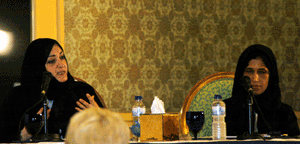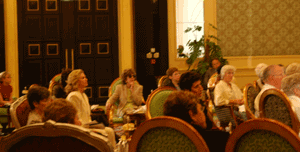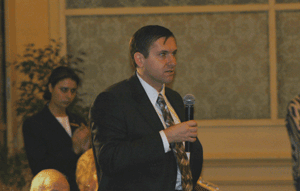Panel Discussion Offers Invaluable Insight into the Position of Women in Qatar
One highlight of the events of October 11–13 was a panel discussion focusing on the position of women in Qatar, organized by the Office of Public Affairs at WCMC–Q and held at the Ritz-Carlton Hotel on October 13. The event generated great interest and an excellent range of questions from an audience that was clearly engaged by the thoughtful responses from the participants.

Dr. Ghalia bint Mohammed bin Hamad Al-Thani
and Dr. Hessa al-Jaber
Those invited to speak were Dr. Ghalia bint Mohammed bin Hamad Al—Thani, chairperson of the department of pediatrics at the Hamad Hospital and the first person from Qatar to be elected to a United Nations Committee (the UN Committee for the Rights of the Child); and Dr. Hessa Al-Jaber, an expert in the field of information technology (IT) and program director of the information, communication and technology project, set up by the state of Qatar with the aim of ensuring that the country becomes an “information society” by 2010.
Dr. Hessa outlined the ambitious targets set by the government to raise the rate of IT literacy, encourage research and development, and establish widespread e–business and e–government in the state within the next 7 years. She noted the importance of educational reforms, and outlined a number of measures that will address the present shortage of skills in the field and improve the country’s IT capacity. Among these are the provision of very high (310 mbps) bandwidth connectivity, and the establishment of a Science and Technology Park in Education City. Looking at her own family, Dr. Hessa predicted that her daughters would have excellent career opportunities and commented: “they can compete with their boss, and be as good.”
Dr. Ghalia said that the western media tend to give a false idea of Qatari women; she considers Her Highness Sheikha Mozah, wife of the Emir, to be both a role model and an agent for change. Dr. Ghalia noted that the status of women in Qatar had improved rapidly in the space of a decade, without seriously damaging the religious and cultural base of society in the Gulf state. She also paid tribute to significant progress in the field of human rights and representative government: “in my mind, the Emiri decree setting up the National Committee for Human Rights, and the establishment of parliament, are major steps towards democracy.”

Audience at WCMC-Q Panel Discussion
When asked how families have reacted to the changes in society, particularly with reference to the effect on girls, Dr. Ghalia said that there is some concern over the possible negative results of rapid change. She noted that Qatar had been a very sheltered society until recently, but added that it is important to equip people with knowledge of their rights, and “to empower them to make choices.”
Both Dr. Ghalia and Dr. Hessa felt that young women have moved on from the concerns of a previous generation, to know that opportunities are there for the taking: resistance from families, said Dr. Ghalia, “is a thing of the past.”
Asked by Mrs Joan Weill if family life has been affected as more women go out to work, Dr. Ghalia responded that there are concerns about this. One negative consequence is an over–reliance on nannies, and she believes that among the consequences of this are health problems including obesity in children, which she observes in her practice as a pediatrician. Dr. Hessa concurred, saying that children’s mental development is also suffering, although she pointed out that working Qatari women are entitled to two years’ maternity leave.
It was also acknowledged that some psychiatric problems have begun to appear as a result of rapid change. Dr. Ghalia felt that there is a need for pediatric psychiatrists in Qatar, but she noted that there are very few in the Arab world.

Dr. Robert Thorne
Dr. Robert Thorne spoke of the change in the position of women in the U.S. over the past 40 years, and said that there had been some resistance from men, which he attributed to fear; he asked whether the same problem had been seen in Qatar. Dr. Ghalia explained that she had experienced none in her career, but she was well aware of the problems experienced by other women in the professions. Dr. Hessa recalled that she had experienced considerable difficulties on joining Qtel (Qatar Telecommunications) as an IT adviser, and she had found it necessary to be very competitive in a workplace where men were in the majority.
There was agreement also on the need to open up opportunities for women across a broad range of careers. As Dr. Ghalia noted, “political will” is the most important factor, and she singled out Education City as an excellent example of how the country is investing in its young people.
When questioned about a “digital divide” between men and women, and wealthy and low-income families, Dr. Hessa reported that one survey had shown that only 5% of Qatari women use the Internet, against 49% of men, and she said that the government would be targeting girls in schools as part of its drive to raise the level of IT literacy in the country. There are also proposals to subsidize the provision of equipment and access to the Internet for low-income families, she added.
To a question from Sir Christopher Paine, a member of the Joint Advisory Board of WCMC–Q, about using IT to disseminate careers information and how WCMC–Q might help in this, Dr. Hessa replied that the College could play a useful role thanks to its state–of-the–art technology. She explained that information about the College, which is accessible by electronic means, could be made available to children in public schools throughout the country, via the Qatar Foundation network.

Dr. Antonio Gotto, Dean of WCMC–NY
Dr. Antonio Gotto, Dean of Weill Cornell Medical College in New York, said that WCMC–Q provides a wonderful role model for women in Qatar, with women making up 70% of the inaugural class, and he asked for the panelÁs opinion on the opportunity the College offered for women to study and train in Qatar. Dr. Ghalia identified the great strengths of the College as its very high standards – it had been “very important” to know that the M.D. degree to be offered is from Cornell University – the continuity it would offer in medical education and training, and the opportunities it would open up for graduates to do research. She observed that there are several hospitals and centers of excellence, but no research facilities in Qatar, and she identified this as an area where the College would make a huge difference.
To a further question on how the women who graduate from WCMC–Q will be regarded by society at large, Dr. Ghalia responded that they will have a special place: “they will be respected and appreciated,” she said.
